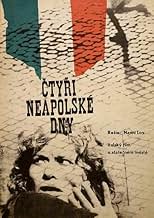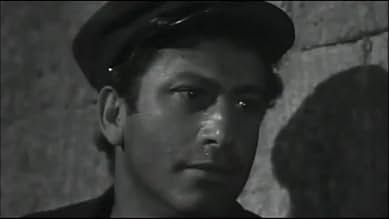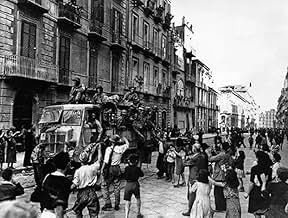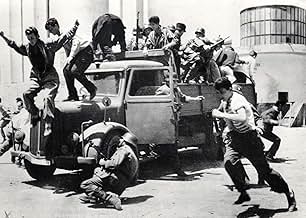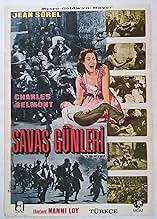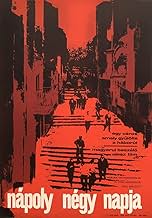Le quattro giornate di Napoli
- 1962
- 2 घं
अपनी भाषा में प्लॉट जोड़ेंThe film shows the history of the Neapolitan popular revolt against the invading Germans during World War II. During the four days in Naples, the revolt turns over in just a few hours. Neapo... सभी पढ़ेंThe film shows the history of the Neapolitan popular revolt against the invading Germans during World War II. During the four days in Naples, the revolt turns over in just a few hours. Neapolitans slung on rifles and guns or armed themselves with stones, house-objects, gasoline-b... सभी पढ़ेंThe film shows the history of the Neapolitan popular revolt against the invading Germans during World War II. During the four days in Naples, the revolt turns over in just a few hours. Neapolitans slung on rifles and guns or armed themselves with stones, house-objects, gasoline-bottles, anything and everything, anonymous and silent. Gennarino Capuozzo, a 10-year-old k... सभी पढ़ें
- 2 ऑस्कर के लिए नामांकित
- 9 जीत और कुल 9 नामांकन
- Giovanni Ajello
- (बिना क्रेडिट के)
- Sailor
- (बिना क्रेडिट के)
- Concetta Capuozzo
- (बिना क्रेडिट के)
- Immacolata
- (बिना क्रेडिट के)
- Partigiano
- (बिना क्रेडिट के)
- Cicillo
- (बिना क्रेडिट के)
- Scared Woman
- (बिना क्रेडिट के)
- Strongman
- (बिना क्रेडिट के)
- Gennaro Capuozzo
- (बिना क्रेडिट के)
- Pitrella
- (बिना क्रेडिट के)
- Sakau
- (बिना क्रेडिट के)
- Arturo's Mother
- (बिना क्रेडिट के)
- Scared Woman
- (बिना क्रेडिट के)
- Grieving Woman
- (बिना क्रेडिट के)
- Maria
- (बिना क्रेडिट के)
फ़ीचर्ड समीक्षाएं
Small stories of individual lives and relationships splintered apart by the actions of Germany in Naples after the Allies have declared victory in Europe in WWII isn't a subject many people will jump at the chance to see, but they should think again. We may never have the experience of being under occupation here in America, but that doesn't mean we can't appreciate and feel the bravery of a city that fights back against the tyranny of the weary German army. And if you have an aversion to war films, subtitled ones in particular, don't worry; the performances from the actors involved are strong enough to feed the emotions onto the screen without need of a translator.
This is a gem not many people know about. It's a shame. This is a film that needs a revolution in the minds of cineastes everywhere.
I watched this film in basic training camp in 1963. I did not know at the time if I was being ordered to Southeast Asia to participate in the war there or not. I had had a vision on the firing range that an active combat role in Viet Nam would be more terrible than I could ultimately live with in later years. Fortunately, I was sent to the staging area on Okinawa, and not to Viet Nam. I saw the film again when I reached Okinawa, and became aware of the war a thousand miles away.
The film crystalized for me that mankind could choose not to fight wars to settle disputes between countries, and that passionate citizens could resist the most disciplined of armies. The Neopolitan people's example to me from twenty years before, as I stood at the brink of the Southeast Asian war, spoke deeply to me of what humanity must strive to achieve through the advancement of its behavior and character.
I long to see the film again, or to read the source book, as world events swirl around us, echoing themes in the Four Days of Naples.
For years I've tried to buy it, Le Quattro Giornate di Napoli, with no success. Then this year,TCM showed a very clean copy of it. But still I can't find a place to buy it. It is so worth having --
If anyone knows where I can buy it, I would be grateful.
क्या आपको पता है
- ट्रिवियाAll actors accepted to be uncredited in honor of the civilians who died during the uprising and remained without official recognition.
- गूफ़At the beginning of the scene in which Allejo and his gang of kids are having a shootout from the mountain train and Cazzillo gets shot, around 1h 31min, a piece of glass in front of him reflects the crew.
- क्रेज़ी क्रेडिटWhen the MGM lion roars, no sound comes out of its mouth.
- कनेक्शनEdited into Film socialisme (2010)
टॉप पसंद
- How long is The Four Days of Naples?Alexa द्वारा संचालित
विवरण
बॉक्स ऑफ़िस
- बजट
- $8,00,000(अनुमानित)
- चलने की अवधि
- 2 घं(120 min)
- रंग
- ध्वनि मिश्रण
- पक्ष अनुपात
- 1.66 : 1

